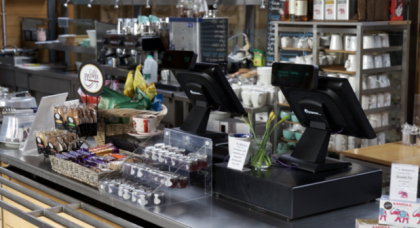What is EPOS?
The age of the internet, of information, of data collection, has led to huge changes in the way commerce takes place. EPOS is a key part of that. New technology, now increasingly sophisticated and accessible, allows small and large businesses alike to benefit from greater flexibility, sales data, and security that EPOS provides.
An investment in the right technology will help fuel your company’s growth. But there are a lot of factors to consider.
Let’s start with a basic EPOS definition, EPOS system meaning, and the benefits for business.
What is an EPOS till?
What does EPOS stand for? EPOS stands for Electronic Point of Sale systems (sometimes referred to as POS systems). EPOS systems are modernised tills that help manage and improve business operations in a wide range of areas from data collection, accountancy, product and inventory management to sales processing.
What does EPOS mean for business?
EPOS combines the basic functionality of a cash register with the greater potential of computer software and the growth and adaptability of a web-based system. What this leads to is a product businesses can rely on for everything they need to run the business, plan for the future, and keep records of trade.
With such a strong foundation, businesses can then use an EPOS device to expand into different areas of commerce. For some businesses, this means connecting to a website, or an app that provides online ordering services or opening more branches which can be integrated into one system for multiple stores.
The flexibility of EPOS systems can be a huge advantage to growing businesses as the system can grow alongside the business
Gain all the advantages of an EPOS system with detailed, flexible, downloadable reports, and so much more:
- Manage and update products quickly with easy to use software
- Expand your business into multiple channels and integrate with a variety of online platforms
- Manage multiple locations and salespoints with multi-site management
- Keep queues short with streamlined, modifiable sales processes
- Choose a setup that suits you with software and hardware options

What is EPOS hardware?
Depending on your business, your system is going to have different requirements to suit your needs. For both retail and hospitality, there are many additional hardware items businesses may find useful. But there are items that most businesses can expect to need as part of their system. For example, in addition to the main EPOS terminal (till), typical businesses might have a system composed of these items:
- Receipt printer- Small printing device using ink or thermal paper creates a customer record of the transaction.
- Barcode scanner- Electronic scanner that reads barcodes allowing you to identify product items on the EPOS system.
- Card machine- A card payment processor used to electronically transfer funds via chip and pin, contactless or Apple/Android Pay.
- Cash drawer- A lockable metal drawer used to store cash
Combined, these devices can make a streamlined sales and business management retail system that saves time on every task. For instance, with a cordless barcode scanner, stock checks can be completed quickly in the shop by scanning and inputting the counted amount.
Card processing devices can be integrated with the till screen, sending transactions directly from the till to the credit card reader. This saves time, shortens queues, and gives staff the freedom to engage for longer periods of time with the customers themselves.
EPOS hardware utilises modern technology to bring previously isolated devices into one coordinated, customised, service providing system. While the above example applied to retail stores, the hospitality sector is no different.
With mobile payments, web-based printing from bar to kitchen, and online ordering integrated into your EPOS, sales across multiple channels can all be managed in one place. Working in such a coordinated way allows EPOS system to create something far greater than the sum of its parts.
What is EPOS data?
Where traditional cash registers record sales and print receipts, EPOS systems record this transactional information and generate detailed sales reports in response to the data input. This affords owners and managers more insight into their business, allowing them to make actionable changes to increase revenue and cut costs.
EPOS reporting covers areas from employee productivity, stock figures, accounting and customer credit information.
A system’s software also retains detailed transaction data. Transaction data can be essential for handling returns and complaints, as managers can easily find out who served a customer, what time this was done, and what was paid.
These reports help businesses run more efficiently and effectively. The essence of EPOS is about operating in real-time, modifying systems in response to the contemporary needs of businesses.
Most EPOS systems can be customised to help businesses run their operations including loyalty schemes, staffing, accounting, stock levels management and marketing facilities. Many of these processes can be automated, much like the creation of EPOS information, so very little needs to be done to complete tasks like stock management. This saves users hours and allows businesses to focus on boosting sales and engaging with customers.

What are EPOS benefits?
The biggest EPOS advantages undoubtedly stem from how the software simplifies, streamlines, and connects multiple aspects of business operations. The advantages of modern computing mean that different companies can integrate their software and data can be transferred quickly and easily between forms.
This means, for instance, that customer loyalty programs can be managed and updated through an EPOS system run by the EPOS provider. Accountancy can be completed through programs with data automatically exported when the day's trading is finished.
Customers keep their loyalty programs and have fewer hoops to jump through to complete sales. The workload of the staff running the business is lowered, and management has greater understanding and control over these processes.
In addition to speedy touchscreen terminals, the front till software can be modified to suit business needs. While retailers rely on barcodes for product numbers, hospitality (and bestselling retail products) can be coordinated for easy sales processing, and then sent through to the integrated card machine for payment.
Managers control how and where products appear, with ordering and colour coding available. This can be done from anywhere in the world due to the use of cloud technology. The enormous amount of data generated and manipulated by the EPOS software is stored on the provider's servers, and accessed via secure login information.
A solution to business problems
Epos Now have been providing the very best EPOS technology to businesses for over a decade, giving businesses the opportunity to benefit from a system that expands with them. The Epos Now solution is in use across the world, and there’s never been a better time to join:
- A top-of-the-range, cloud-based solution updated each month to ensure you never fall behind
- Easy to use transaction software for a streamlined sales process for payment processing
- Hundreds of flexible, detailed, downloadable reports to ensure you’re fully informed and able to make the best business decisions
- The very latest app options to optimize your potential in marketing, accounting, product and inventory management, eCommerce and more
For the very best hardware and software offers, take a look online or submit your details below to have a conversation with our expert team.
Get Started with a multi-award-winning EPOS system
Submit your information to speak with an expert and find out more about how Epos Now could benefit your business.



